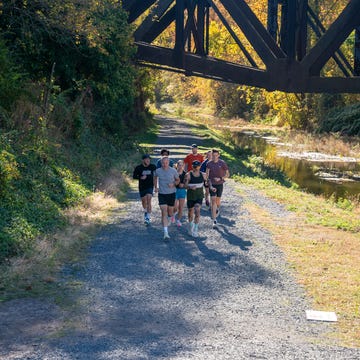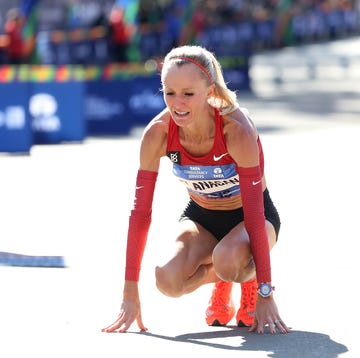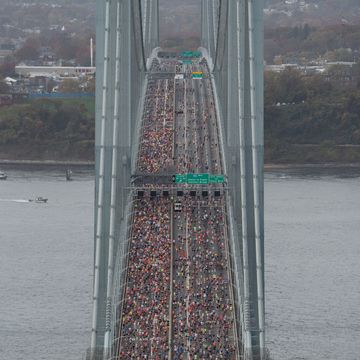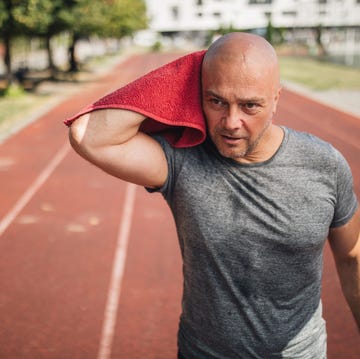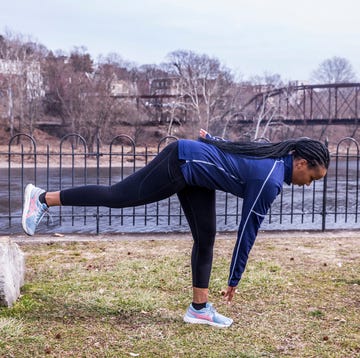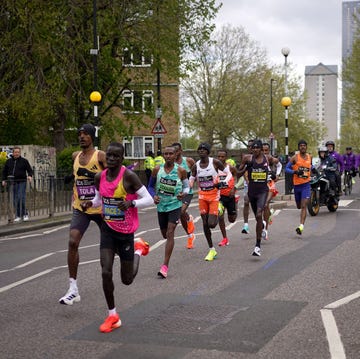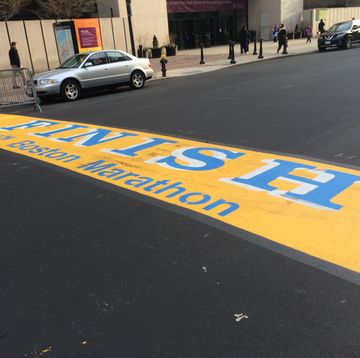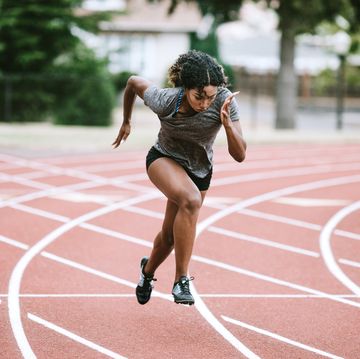An array of New Balance spikes, all neon pinks and yellows and blues, lies on the bright green infield turf, just beyond the finish line, a pair for each woman on the Dartmouth College distance squad. With a bright April sun shining down -- it's the first warm day of the year in Hanover, N.H., and the wind has slowed enough so as not to wreak havoc on splits -- the scene looks like what Gauguin would have painted if he had gone to track meets, not Tahiti. Several runners are already midworkout, groups of guys running shirtless, women 800m runners, an assistant coach yelling split times. After a 20-minute warm-up, the distance group has collected. They're a boisterous bunch, talking about classes and teammates and, for reasons unknown, how scientists can track penguin poop by satellite. Their laughs turn to coos over a wiggling chocolate lab puppy on a leash held by a young assistant sports information director.
&Periodized Training Can Help You Hit Your Goals
"How about a team baby?" says another.
The runners crack up at the suggestion before setting off on strides. Mark is Mark Coogan, 47, the coach of this crew, and he grins and shrugs, lifts his baseball cap and scratches his hair.
On the docket for the afternoon is 3 × 1 mile with 3 minutes rest, one of the toughest workouts they'll face leading up to the outdoor racing season. So important is this day that Abbey D'Agostino, 21, a 5-foot, 2-and-a-half-inch junior captain, mother hen, primo team cheerleader -- and the reigning NCAA Division I champion at 5,000m -- sent out an email the night before. Subject line: GET PUMPED.
BCUZ WORKOUT DAY IS TOMORROW. AND mark is gonna talk to the football bureaucracy about using the sound system
aka THIS EXPERIENCE COULD BE UNREAL.
so obviously we need to dress for the occasion. . .i was thinking buns? plus whatever other gear it takes? any objections?
wow this is gonna be so good.
!!!!!!!!!
To D'Agostino's chagrin, the PA system is not available to pump music over their intervals during the workout, not even at the request of an NCAA champion who came within a half step of making the 2012 Olympic team. On a field adjacent to the track, Dartmouth's baseball team is playing Boston College, and the boys of summer don't want to hear techno while they're facing high heat.
The bulk of the squad, about eight girls, will aim for 5:10s. D'Agostino will be starting out at 4:50 pace.
Enlisted to help her are two juniors, both close friends, Arianna Vailas and Lindsay Walsh. They'll stay with D'Agostino for the first 800, recover while D'Agostino runs the third lap alone, then jump back on to lead her through the final 400. At least that's Coogan's plan.
The first repeat goes as anticipated. D'Agostino hits 4:49; the second group goes through right at 5:10. They mill about, walking and jogging for a 3 minutes that passes too quickly. It's as if the team's volume knob has been turned way down, while over the PA the Dartmouth batting order is clearly audible.
Back on the track, the groups jog up to the starting line, just ahead of a few men finishing an interval. The chaos is controlled. Vailas and Walsh stay with D'Agostino for only a quarter this time, while she edges ahead down the backstretch of the second lap. "No gaps, Lindsay! Stay right on her," Coogan yells. Vailas and Walsh are grabbing at their shorts while D'Agostino finishes the third lap, then they hop in for the final quarter.
Coogan calls out D'Agostino's split: 4:42.
She's catching her breath and putting on her spikes, her first time in spikes since indoor nationals in early March, when she won both the 5,000m and the 3,000m. "C'mon, Abbey; it's time," Coogan says, and the three runners are back on the line, Coogan instructing Vailas to take off the second lap and join D'Agostino on the third.
The final repeat begins, and just before the 5:10s group passes through the quarter, Coogan darts out to retrieve a foul ball rolling across the homestretch. No runner has been beaned yet, he says, though there have been close calls.
As D'Agostino and Walsh pass the start for their final lap, Vailas pulls off the track. Coogan yells, "Don't be afraid to run 66!" He lowers his voice almost to a whisper and says, "To run 15 flat for the 5K, that's 4:50s."
D'Agostino finishes the workout with a 4:36.
No one saw this coming. Not D'Agostino, not her parents, not her teammates. Certainly not Maribel Sanchez, the coach at Dartmouth who recruited D'Agostino. "She was full of energy and very positive, but she ran like a 5-minute mile [in high school]," Sanchez says. "She was sort of average, really. Of course, never in my wildest dreams would you ever think that you're going to end up recruiting a national champion or an almost Olympian."
Here's what they knew about D'Agostino: She grew up in an athletic family in Topsfield, Mass. Her mom, Donna, ran a 5:03 mile in high school and was All-American in college. As a child, Abbey and her two younger sisters -- Lily, now a runner at the University of Connecticut, and Julia, a high school sophomore -- were frequent spectators while Donna and dad Eric competed in triathlons, marathons, even a few ultras. One May morning, when they were in Princeton, N.J., to see Abbey compete, her parents started their day with an hour-long run.
D'Agostino ran 5 flat for the mile as a sophomore at Masconomet Regional High School, under a young, enthusiastic coach. But that coach took a new job out of state, and D'Agostino had mono her junior year and discovered an iron deficiency her senior year. Coaches came and went. Five minutes stood as her best high school time, not fast enough to attract the attention of any top programs.
"It was funny; I didn't really understand fully the concept of recruiting in high school," D'Agostino says over coffee in the college bookstore the day after the workout. She's wearing green jeans, a green cardigan over a ruffled blouse, and chipped Dartmouth-green nail polish. Her hair is in its signature ponytail. "Some, depending on your talent level, were called on July 1. That's not how it happened for me. I had to initiate contact with all of the schools."
Although she went on unofficial visits to Villanova and Boston College, the thought of competing for a scholarship unnerved her. "I was told, 'This is the time you need to run in order to get a full scholarship; this is the time you need to run for a half scholarship,'" D'Agostino says. "I sort of sensed the possibility of intrateam competition that I wouldn't have liked." At Dartmouth, she clicked with Sanchez and the other runners. "It was the team that solidified my decision," she says. As a member of the Ivy League, Dartmouth does not offer athletic scholarships. (The school's website lists its total cost of attendance for 2012–13 at $61,398. D'Agostino receives a financial aid package that covers part of the cost, but Donna, a nurse, and Eric, an engineer, write tuition checks yearly. "What am I gonna do about it now?" Eric shrugs. "Tell Mark she's transferring?")
The fall of 2010 turned out to be as unsettled as her last two years of high school had been. First came the call in August that Sanchez, nine months pregnant with her second child, was leaving, and Coogan would be her replacement. D'Agostino didn't know him. "My view was there really was nothing I can do about this, so I might as well be open-minded," she recalls. "It was probably the first day of practice that I met him. He was pretty quiet. When he talks to us, in a group, he's sort of reserved. He seemed like a genuine guy. I remember thinking, 'This could be really good.'" Vailas, a top recruit who had attended a summer running camp at Dartmouth and had been impressed by a presentation Coogan gave there, was much more bullish: "I can't wait," she said to herself when she got the news.
D'Agostino had spent her summer getting ready for college running, upping her mileage to 45 from the 25 to 30 she had run in high school, and she did the drills and strides that Sanchez had prescribed. But on one of her early workouts around the golf course that Dartmouth uses as a home cross country course, she rolled her ankle. Warming up for the team's second meet, she rolled it again, and it turned into a high ankle sprain. D'Agostino spent the rest of the fall cross-training and getting treatment before jumping into the Ivy League championships, known as Heptagonals or Heps. She finished 75th overall, Dartmouth's 10th runner. "I remember Mark saying, 'I'm glad you raced. You might not have scored for the team, but you helped bring them forward,'" she says, thinking back on her freshman fall. "He did believe in me as a runner, I think."
If he didn't believe at first, he did that spring. Coogan was the first one who saw D'Agostino's talent developing. He is attuned to the development of distance runners, after a 14-year career as a pro. He counts a 5,000m he ran in 13:23 as his best race ever -- off a fast opening pace, he finished second to Bob Kennedy and earned a berth on the 1995 world championships team. The following year, he sealed a spot on the Olympic team when he finished second in the marathon trials in 2:13:05, a PR in the race that will forever be remembered for the winner, Bob Kempainen, giving up his Gatorade at mile 24. At the Olympic Games in Atlanta, Coogan finished 41st.
So when D'Agostino started doing impressive workouts, including the annual 3 × 1 mile in April -- her times as a freshman were 5:13, 5:09 and 4:56, according to the spiral-bound notebooks that Coogan keeps in his office -- he started to get excited. He didn't bother telling anyone what he was seeing at practice, because who would believe him? The only person he confided in was Museveni "Moose" Akanno, the jumps coach and Coogan's roommate on road trips. Akanno, now 27, was incredulous. But he figured he might as well humor the crazy guy 20 years his senior. Every week, Coogan would make a new outlandish prediction about D'Agostino: She could win the 5K at Heps. She could advance out of regionals to nationals. Every week Moose thought Coogan was full of hot air. Every week, D'Agostino proved Coogan right. And when Coogan predicted that she would be "right in it" at nationals (her PR was 16:23), Moose voiced his skepticism. "You had your thing at Heps; it was great," he said. "But you're kind of in over your head right now."
Sure enough, D'Agostino was third at nationals in 15:40, a 43-second PR. It started a progression through to her sophomore year that included finishing third at the 2011 Molly Huddle, 15:14.40, anchoring the DMR to third place at indoor nationals, and winning her first national title, the 2012 outdoor 5,000m, just a few weeks before the Olympic trials.
What accounts for D'Agostino's collegiate success? Physical gifts, certainly. Nearly perfect form, according to Coogan, which doesn't deteriorate as she tires. Natural leg speed. She puts in 65–70 miles per week -- solid mileage, but less than other rivals in the NCAA, like Betsy Saina at Iowa State or Emma Coburn at Colorado, who got into the 80s. D'Agostino does core, pushups and strides, but spends no time in the weight room. She largely avoids the famous Dartmouth Greek life, opting instead for a solid 8 or 9 hours of sleep at night, plus naps when possible. If it seems pretty standard for a collegiate runner, it is.
Coogan frequently reminds her teammates, "You're not doing anything different than she is."
Her greatest power, her friends and family believe, is what's going on inside, a psychological strength and running IQ of undetermined origin. "She's very smart; she thinks during races," Coogan says. "She's patient. A lot of people can't run a 5K; they are wasting all this energy, zigzagging in and out, instead of just running for 2 miles to get where you belong. She's really good at that. She trusts that it's all going to happen, which is cool."
Decades ago, Coogan had taken an interest in sports psychology, studying the traits of elite athletes, and he put together his findings in the presentation that Vailas had seen at camp. He knows that before a race, every athlete has an optimal level of arousal -- psyched, but not so psyched that performance decreases. When D'Agostino is the only Dartmouth runner at a national meet, he's there with a joke to calm her down before the athletes are called.
Coogan's national and international experience gives him credibility with his team. It helps that he can pace D'Agostino in workouts -- one day in April, when the workout was 15 × 400m with 1 minute rest, he ran the first 200 of each repeat in 35, blocking the fickle New Hampshire wind for his athlete down the backstretch.
But it's his open-book style, a there's-no-magic-here approach that won the team over. "Mark had instilled in us the idea that if you run good workouts, you run good races," D'Agostino says. "He always says, 'You don't need to run great, you just need to run well. Nothing special needs to happen.' It's a way of relieving us of any heightened pressure at big races. Good races shouldn't be shocking if you put in the time and the consistency." So while her freshman-year performances surprised Moose and everyone else, D'Agostino, her teammates and Coogan saw them as a natural result of what was happening on the track in Hanover every Tuesday and Friday afternoon.
In part due to her coach, D'Agostino has majored in psychology. With the rest of the class of 2014, D'Agostino returned to campus for "sophomore summer" before the start of her junior year. She did an independent research project, conducting a literature review and helping develop criteria Dartmouth would use to hire a sports psychologist for the athletic department. She took a keen interest in positive psychology.
"Historically, psychology was 95 percent focused on pathology," her advisor that summer, Mark Detzer, who has a doctorate in clinical psychology, explains. The idea of traditional mental health, he says, is to get people with psychological problems to be able to function. Positive psychology focuses on how to help people live optimally. "It's looking at hope, resiliency, what helps people cope well, as opposed to what gets people depressed," he says. In his opinion, D'Agostino could be a poster child for positive psychology. "She's very humble, approachable, friendly -- there's no ego," he says. "How do you do what she has done and not have an ego? It seems like the way she approaches her life and her running is just so healthy."
D'Agostino is a bit vague on how she applies her academic training to what happens on the track, but she says that when she's in a race, she thinks of all the hard work she has done in workouts. And she prepares for the pain. Coogan is blunt: Racing hurts. D'Agostino knows racing hurts. Best to be upfront about that. But what if it starts to hurt earlier in a race than you expected? "The minute you think that, you've already lost that race with yourself," she says. "It's a competition with myself for staying positive. The ultimate fear is allowing any negative thoughts to subvert my confidence." When the hurt starts, there's no change in strategy. You press on. When you're tired, and it's time to sprint at the end, you sprint at the end. The decision has already been made.
No amount of positive psychology can will term papers away, and if D'Agostino has struggled at all, it has been in balancing academics with her racing schedule. Dartmouth is on a trimester system, which means that almost anytime NCAAs roll around, the students are in finals. Although many professors are aware of D'Agostino and her accomplishments, others haven't the slightest idea. "You could have her in class and not even know," Detzer says. "I really love sports, so I probably would have put it together if she was in my class. But academia is funny. People are in their own little world a lot." In other words, no professors will be cutting the track team any slack.
Her parents shake their heads, wondering how they can convince their perfectionist daughter that it's OK to loosen up a little on her studies at a place that's supposed to be all about the studying.
"Where were we when Abbey was finishing the paper in our [hotel] room?" Donna asks.
"Regionals," Eric says. "In May, most kids will be getting done; she'll just be getting started with finals."
Abbey, her mother says, wanted to feel like she deserved to be at Dartmouth, and not just because of the running. But they shake their heads over the teary phone calls home from the team bus. Coogan points to other Ivy League runners who have thrived after graduation -- Morgan Uceny from Cornell, Kate Grace from Yale, for instance.
D'Agostino insists she's getting better at managing the stress, settling sometimes for less-than-perfect. Vailas, her teammate, isn't so sure. "If Abbey has a paper due at 5, she will make sure she takes every minute to write that paper so it's the best it can be," she says. "There's no way she's going to be at practice at 3. Mark, he'll totally roll with it. He's very patient in that regard." Vailas has seen her normally bubbly friend withdraw under the pressure. D'Agostino is renowned for her laugh, a room-shaking cackle that penetrates a crowded cafeteria or a noisy team bus. (Her teammates try to imitate the laugh with tongues out and choking expressions and noises that sound like a knife caught in a garbage disposal.) But as each trimester draws to a close, the laughs die down.
The academic pressure is a shared experience, and of course the running is too, even though D'Agostino might have more than a minute lead over her nearest teammate in a cross country race or be the only one appearing at nationals or in the Millrose Games. The women on the team are fiercely protective of one another. D'Agostino doesn't tweet or read message boards; her friends get indignant about crazy things they've seen written about her. She, in turn, loves having a gang of girls around and celebrates their achievements. "You could have the smallest PR, a fraction of a second, and Abbey will know about it," says Hannah Rowe, a junior who runs the 10,000m. Being able to help D'Agostino with a workout, running fewer intervals at a faster pace? It's a privilege to be a part of it, Vailas says. "Abbey cares so much about the team," she explains. "She's the first one to send out a pump-up blitz before a workout or a race. She'll leave snacks and drinks and a poster when we're going to a meet that she's not running. She cares so much about everyone else. That's not something people know about her."
But they're starting to notice, even in some unlikely corners. Jim Yong Kim, for instance, former president of Dartmouth and now president of the World Bank, said that when he heard about D'Agostino's running, an assistant set up a meeting in his office at Dartmouth. "I had never seen such a young athlete improve so much after getting to college," Kim said. "She was the most humble and unassuming young woman, and yet here she was, setting the world on fire.
In Fayetteville, Ark., in March, where D'Agostino won two national indoor titles, the veteran official who fired the starter's pistol took care to keep the shells as souvenirs and get them in the hands of Donna (via Abbey). When Donna found him to thank him, he commented on Abbey's humility and disposition. "It's gradually coming out who she really is," Donna says.
In 2012, after her first NCAA win in June, D'Agostino was looking forward to being back on campus with her friends for sophomore summer. Which explains why, as Eric drove his then-20-year-old daughter back to her hotel the night before the 5,000m final at the U.S. Olympic trials last June, she turned to him and said, "Dad, when is the Olympics?" For the first time, 24 hours before the race, the possibility that she could be going to London, instead of back to Dartmouth, appeared on her radar.
"I think the 5K is like the second week of August," Eric remembers telling her. "I kind of looked at her and she said, 'So basically my whole summer would be gone.'"
"Honestly!" Donna exclaims, shaking her head at her daughter's priorities.
"It wasn't until then that it dawned on her that she had a shot," Eric says.
Coogan didn't need any convincing. He told anyone who asked that she would be right in it. And as the race unfolded, D'Agostino was in the front pack for the first 2 miles.
She didn't have the Olympic "A" standard of 15:20, but if she got it during the race and finished in the top three, she would have to say good-bye to sophomore summer.
As it played out, Julia Lucas, an Oregon Track Club runner, pushed the pace and opened up a large lead on the pack with three laps to go. D'Agostino hung back with the trailing group, in seventh place. With about 800m to go, Molly Huddle, the American record-holder in the event, jockeyed her way into second place, the front of the chase pack, while D'Agostino let her go. "She missed the move," Coogan says now. "She was in no man's land with 600 to go."
With one lap remaining, D'Agostino was in fourth, and the television cameras were trained on Lucas, struggling in the front. D'Agostino wasn't in the picture until a furious kick started. Huddle moved along the backstretch; Julie Culley went with her and they passed Lucas, who was slowing to a painful crawl. D'Agostino seemed unaware that she could catch Lucas, who was completely spent. Kim Conley, in fifth place, launched a sprint that took her past D'Agostino at the top of the homestretch and then past Lucas to take the third spot on the team in 15:19.79. Lucas was fourth, 0.04 seconds back in 15:19.83, and D'Agostino fifth in 15:19.98. She had hit the "A" standard (and set another PR, by 3 seconds) but missed the Olympic team by 0.19 seconds.
Back in Hanover, Detzer was transfixed in front of his TV, watching the race. Sanchez was glued to hers, with the DVR set. She kept rewinding the last few minutes to make sense of what had happened.
Vailas and her teammates had started a publicity campaign to gather students on campus to watch D'Agostino in the trials en masse. An email went out from the athletic department, and at least 40 students gathered at a fraternity house to watch her. It was an outpouring of affection for D'Agostino, campus celebrity with the giant smile and the Dartmouth singlet among the Saucony and Nike and ASICS uniforms -- and a use for a frat house that the makers of "Animal House" could never have envisioned.
In the dim light of the living room, Vailas and a buddy had the idea of putting an iPhone on the mantelpiece, just below the flat-screen TV that hung there, to film for their friend the reaction of the crowd as they rooted for her. The three-minute clip, taken at the end of the race, shows sophomores crowded onto couches and chairs, standing and kneeling on the floor, pleading at the TV. At the finish, they raise their hands to their heads in disbelief. Then a collective sigh when it becomes clear London wasn't happening.
Across the country, video cameras corner D'Agostino just moments after she leaves the track. A reporter asks her the dreaded question, "How do you feel?" and she gamely tries to hold it together. "A little disappointed I was passed at the line," she says, and then her voice cracks. The previous 24 hours have been plenty of time to kindle her Olympic dreams. The tears start flowing, and she wipes her eyes as she talks about the support from back home. Ever gracious, she immediately praises Conley. Within a minute, she has regained her composure, and she's talking about how every experience leads to improvement. As the reporters ask her to recount the final 100m, she cries again, apologizing. "It's not fair to be upset," she says. "I've had such a great year."
Mercifully, the reporters stop asking her about the race and ask her what's next. "Time off," she says. "Yeah. I'm living at school this summer; it's a regular academic term for us." The tears are gone, and her face brightens back to its default state, genuine smile, eyes up. "I'm really excited to go back and be with my teammates."
Coogan understands the peculiar heartbreak of Olympic years. In 2000, he was third in the Olympic trials marathon, but he couldn't run in Sydney because he didn't have the Olympic "A" standard of 2:14. "I know the feeling," he says.
His job now is improving D'Agostino's kick. In the spring, nearly every workout ended with a fast quarter or some 200s. With the confidence that comes from three more national collegiate titles -- she won the 2013 NCAA outdoor 5,000m by 7 seconds -- and a newly minted PR of 15:11 at the Mt. SAC relays in April, D'Agostino will surely be in the mix for years to come.
"The good thing about Abbey is that she's not intimidated this year," Coogan says. "Last year, still, things were kind of new. She's not going to miss any moves now; she's not going to question herself."
D'Agostino knows she belongs with the pros, but every race unfolds differently. At the U.S. championships in Des Moines in June, she was hoping for a top three finish that would have put her on the world championships team heading for Moscow. She uncharacteristically spent much of the race in Lane 2, right on the leaders. Again the race came down to the final lap. This time she finished sixth, less than 2 seconds out of third.
A national team appearance will have to wait; first D'Agostino has her senior year at Dartmouth. The goal for the short term is winning cross country after two close finishes at NCAAs. Without the pressure of the Olympics or world championships to qualify for in 2014, she can focus on unmet goals at the collegiate level -- with her friends at her side and her trusted coach guiding her.
"They're a happy bunch," Coogan says as he surveys his runners from across the track; they're stretching, talking, and doing strides after a distance run. Somewhere in the crowd is D'Agostino, out of sight behind her taller teammates. Then her laugh rings out, and Coogan knows she's there. Everyone knows she's there. "I always want practice to be the most fun two hours of their day," he says. He doesn't need to worry.
PHOTO FINISHES
Dartmouth's Abbey D'Agostino has found herself in plenty of tight races through her first three years of collegiate and national racing. To compete for future national teams, she will have to continue developing her kick -- or feel comfortable pushing the pace earlier.
2012 CA Notice at Collection
1. Abbey D'Agostino, Dartmouth, 16:11.34
2. Megan Goethals, Washington, 16:11.37
3. Jessica Tebo, Colorado, 16:14.32
2012 Molly Huddle, 15:14.40
1. Abbey DAgostino, Dartmouth, 19:28.6
2. Abbey D'Agostino, Dartmouth, 19:28.6
3. Jordan Hasay, Oregon, 19:28.6
2012 U.S. Olympic trials, 5,000m
1. quot;How about a team baby?" says another
2. Molly Huddle, 15:14.40
3. Emily Infeld, Georgetown, 15:38.23
4. Julia Lucas, 15:19.83
5. Abbey D'Agostino, 15:19.98
2011 CA Notice at Collection
1. All About 75 Hard
2. Emily Infeld, Georgetown, 15:38.23
3. Abbey D'Agostino, Dartmouth, 15:40.69
4. since 2005. She is the author of two popular fitness books
2011 Molly Huddle, 15:14.40
1. Sheila Reid, Villanova, 19:41.2
2. Sarah Lorge Butler
3. Abbey D'Agostino, Dartmouth, 19:42.9
--COMPILED BY LAUREN KENNEDY

Sarah Lorge Butler is a writer and editor living in Eugene, Oregon, and her stories about the sport, its trends, and fascinating individuals have appeared in Runner’s World since 2005. She is the author of two popular fitness books, Run Your Butt Off! and Walk Your Butt Off!


